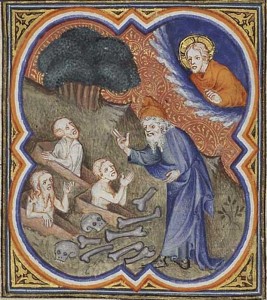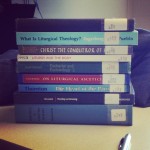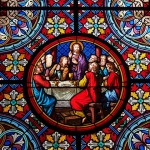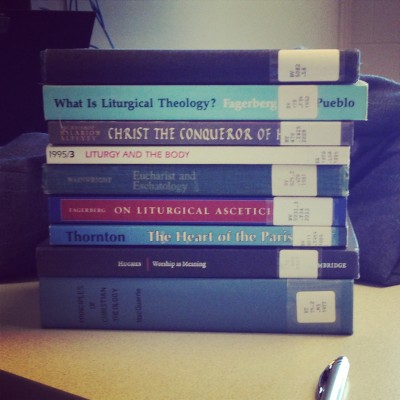If you’re new to my Sermon Notes, you can read about why I prepare them here. They aren’t just for preachers, they’re for everyone!
Thesis
What a glorious day this is in the life of the church! Peter and the disciples were gathered together in Jerusalem—just as the Lord had commanded—after the Ascension and they receive the Holy Spirit. Here we find the fulfillment of Pentecost, the reversal of Babel, and the fruits of new creation in the shadow of Christ’s resurrection. Here we discover the birth of the church and the inauguration of the Holy Spirit’s ministry. And yet, and yet we are always longingly looking ahead to that day when our Lord shall return and all things will be fulfilled and consummated. Pentecost is somehow a reminder that things are not as they will be but they soon shall be and we can hope in that.
I wrote a piece about the nature and meaning of Eastertide during the first week after the resurrection. You can read it HERE because it provides some background about Pentecost (or the Feast of Weeks).
Analysis
Collect
Almighty God, on this day you opened the way of eternal life to every race and nation by the promised gift of your Holy Spirit: Shed abroad this gift throughout the world by the preaching of the Gospel, that it may reach to the ends of the earth; through Jesus Christ our Lord, who lives and reigns with you, in the unity of the Holy Spirit, one God, for ever and ever. Amen.
Of the two collects designated for Pentecost in the BCP, I like the first option better because it speaks to the universality of eternal life—that is, eternal life is opened up to all people from all nations and races. The birth of the church is the birth of the new Israel, the grafting together of Jew and Gentile, slave and free…into one cohesive whole. How? Through the promised gift of the Holy Spirit! God had been promising the Holy Spirit since the time of the Old Testament with the prophesies of Ezekiel and Joel.
How is the gift spread? The Collect suggests that preaching the Gospel spreads the gift of the Holy Spirit. I believe preaching is sacramental in nature—the Holy Spirit inhabits the words of the preacher and opens the hearts, minds and ears of those listening. Preachers can (and should) say “The Word of the Lord” at the end of their sermons because we believe sermons truly are (or should be) inspired by the Spirit for the edification of the church to the glory of God.
Where is the gift spread? It is to be spread to the very ends of the earth. This is no longer tied to nationality or geography; faith and believe in YHWH is now understood through Jesus Christ. The veil has been torn from top to bottom and the one who is “the way, the truth and the life…” has been revealed as the Son of God. The Great Commission (Matthew 28:16-20 makes it clear that the mission is to preach and teach all peoples.
Old Testament – Ezekiel 37:1-14
This is the third of Ezekiel’s four vision narratives. We know this because the passage begins, “The hand of YHWH was on me” and such a statement signifies a state of trance. Ezekiel’s first and third (this one) correspond with one another. The first vision is in 3:22-27 and signifies death as Ezekiel goes into isolation because no one will listen to God. This third vision signifies life, promise and hope.
Our passage is split into two sections: 1-10 is the vision and 11-14 the explanation. Ezekiel is taken to a field/valley of dry bones. Despite being a good Jew and therefore unable to come in contact with dead bodies (he would be rendered ceremonially unclean), Ezekiel ventures out into the field and YHWH speaks to him. The scene here is not unfamiliar to Israel, in fact it is quite common in biblical literature both figuratively (Isaiah, Job) and literally (Jeremiah 8:1-2). The scene here is one of battle and death.
“Mortal, can these bones live?” What a question! Israel believed in some form of resurrection or life after death but it was not the same that we understand it today, even the earliest Christians had to reconcile their understanding of eschatology with or against the prevailing philosophies of the day. Despite any philosophical conundrum, Ezekiel speaks plainly and boldly, “Only you know.” For this is the truth! Blenkinsopp says that Ezekiel neither affirms or denies YHWH’s ability to resuscitate the dead.
YHWH commands Ezekiel to prophesy to the bones and through the proclamation of God’s word the bones come to life. Notice that this takes place in two distinct steps: first, the bones become skeletons and then receive sinews and skin. Second, the breath of God (ruah) is blown into them and they receive life. Is this not the same as Genesis 2 when God formed man and woman and then breathed life into them? Is this not a glimpse of new creation? It is!
The explanation given is that the bones represent the house of Israel who have been gathered back together—brought back from the diaspora—and have been made whole and alive. The reality on this Pentecost Sunday is that the new Israel has been gathered together from the corners of the earth and made one.
The Holy Spirit (as denoted in Hebrew by ruah) is laced throughout the text. 10 different times we see the Spirit at work driving Ezekiel into the field, prophesying, and ultimately animating and resurrecting the dry bones. Blenkinsopp comments, “It is the spirit activated through prophetic preaching which bonds the community together and gives it the will to live and accept its future.”[1] More on this in the “Synthesis” section, but you have a big job to do, Preacher! Prophetic preaching can and does bring dry bones to life!
Psalm 104:25-37
Psalm 104 is a Song of Creation (Brueggemann) and our particular section highlights through main topics: “The glory of animal creation (24-26),” “The spiritual sustenance of the Earth (27-30),” and “In praise of God’s royal splendor (31-35).” The overriding and overarching theme is that God reigns over all of his creation, he sustains that which he has made, and our response should be that of praise.
Verses 24-26 issue a call to worship based on the diversity of God’s creation, “How many are your works, O LORD!” As Christians we should be the first to issue praise and thanksgiving for the vast variedness of the world because we know that God has created each animal, plant, human being and more with loving care. The creativity teeming in creation is overwhelming and it ought to flow directly into our worship. Too often, however, we are left with boring, self-focused music in the midst of plain and stark worship spaces with art that lacks inspiration (or talent). How could we possibly move from the many works of God to that?
Verses 27-30 reveal an active God who sustains his people by sending them his life-giving spirit. Already you should be drawing the connections between this passage and Genesis 2/Ezekiel 37/Acts 2. The life-giving Spirit is the ruah, the very breath of God that animates human life. God continues to give, animate and sustain life through his Spirit. All life is response to God; the structure of this section is “when you…[then] they…”
Our ultimate response is praise. Psalm 104 ends the same way it began: praising God for his royal splendor. The “glory” in verse 31 suggests that God is present in and through his creation. We find the psalmist praising God through song and meditation. We also find the sinner or the wicked being cast out from God. Both the psalmist and the wicked have been given life by the LORD, but how have we responded? Are we “singing praise to our God as lone as we live” or are we scoffing his gift for the short-lived thrills (seemingly) or habitual sin?
Epistle – Acts 2:1-21
We arrive at the climax of our lessons for Pentecost Sunday. Luke records the events of this great feast in detail. As I mentioned above, I recently wrote a piece on Eastertide and in it I described the Jewish feast of weeks; a.k.a. Pentecost. Give it a read here for pertinent background information.
The disciples are gathered in Jerusalem just as the Lord had commanded. We are now 10 days after the Ascension of Jesus and we can assume that the disciples (the crowd of 120) had been together in the city since Jesus departed. Jesus told them that they would receive the Holy Spirit but he did not specify a time or place…they were simply to wait. During this period of waiting they selected another to fill Judas’ shoes in order to have 12 disciples once more. They prayed together, had fellowship and likely broke bread.
The Feast of Weeks is important because it wasn’t simply a harvest festival, it was also a time to recount and rejoice in the giving of the law (Torah) at Sinai. This is one of the most important pieces of the puzzle: YHWH gave Israel the law at Sinai and Torah became their director, center, and indentity. Here we find God giving to the new Israel his Holy Spirit making them “Christ centered and Spirit directed.” Rather than the law in the form of two stone tablets the Spirit would write the law upon their hearts (Jeremiah). But what actually happens in Acts 2?
The Gospel is preached, the Spirit descends, and people come to faith.
This is remarkably simplistic but that’s the entire point. When the Spirit is moving and active there is no need for flash or games.
“They were all together in one place.” When the church is gathered the Lord is present. He is present through the praise of his people. He is present through the preaching of the word. He is present in the Eucharist. Most of all he is present in and through the Holy Spirit. The disciples hadn’t “done” anything to call down the Holy Spirit. One does not simply direct the Spirit to come or go. No! The disciples gathered. Period. What would it look like if we took our gathering (synaxis) more seriously? What would it look like it we actually believed that when two or three are gathered together…?
The disciples were speaking in tongues that could be recognized by the great crowds of God-fearing Jews (those returned from diaspora) in Jerusalem. Luke lists the different races/countries/languages and the important thing to keep in mind here is that they represent the four corners of the earth. If Babel was the dispersion of humans to the corners and the confusing of man’s language then Pentecost is the necessary and promised reversal: the four corners are gathered and the language is one (through the Spirit).
After some mocking and joking about drunkenness, Peter stands up and preaches the first Pentecost sermon. Maybe you should just read Peter’s words this year…just a thought! Our lesson only delves into the prophesy from Joel about the gift of the Holy Spirit and it doesn’t get into the rest of chapter where Peter explains who Jesus of Nazareth was. Look at what Joel saw in “the last days” when God would “pour out [his] Spirit on all people”:
Sons and daughters
Young and old
Servants, men and women
Although not wanting to get too far ahead of myself in the history of Salvation, I am reminded of Paul’s words about in Christ there are neither, “Jew nor Greek, slave nor free, male nor female…” Pentecost means that God’s kingdom has been opened to all people. There are no boundaries in the kingdom when it comes to race, gender or socio-economic status. Furthermore, and this is the key, God pours of his Spirit on all people. Men don’t have the monopoly on the Spirit, neither do Caucasians or the rich. What does your church look like? Who is in ministry in your faith community? The Kingdom of God is not a bunch of rich, white men! No! The Kingdom of God is for the least, the last and the lost—for those who have and for those who have not—for the downtrodden, the burdened, the loved, the unloved, for people from every race, nation, tribe and color. And the Spirit has been given to all of God’s people!
This is revolutionary. This is the birth of something new. This is the birth of the church.
And yet…
Have we squandered it? Have we tried to tame the Spirit? Have we dictated who can or cannot be part of the Kingdom?
The closing line is the charge to all of us to preach the Good News of Christ to all whom we know and meet: “And everyone who calls on the name of the Lord will be saved.” Let’s get back into the business of sharing God’s love through word and action in order that people may find and know him. The Spirit is active in prophetic preaching (and living) but are we being silent?
Gospel – John 15
We travel backward in John’s gospel once more and arrive again at the Upper Room (Farewell) Discourse. We’ve already spent significant time during Eastertide in this long stretch of Jesus’ communication with his disciples and we find ourselves again in John 15. This passage is immediately after the pericope about the vine, vinedresser and branches.
I have written about John 15 in two different places for lectionary-based preaching and you can access those notes here and here (insert link). I don’t want to demean or diminish the gospel lesson—ever!—but I think the Acts passage really should be the focal point of any Pentecost sermon. I want to highlight a few things about this passage for you to use as flourishes:
- The Spirit is the Advocate
- Sent from the Father
- Spirit of Truth (testifies on Jesus’ behalf)
- Jesus has to go in order for Spirit to come
- Spirit to prove world wrong about sin, righteousness and judgment
- Spirit will glorify Jesus
You could easily spend an entire sermon on one of these bullet points. It will be hard not to do that in this sermon! Keep it big picture in order to focus on Acts and simply share who the Spirit is and what he does. We know the Spirit to be from the Father and with the Son. We know the Spirit to be Truth and to testify to Jesus because Jesus is the Truth. We know the Spirit will condemn and convict the world of it’s sinfulness and we should also remember that the Spirit does the same in and for us. We need to hold tight to the fact that the Spirit is present because Christ is physically absent…that is, Jesus ascended and now the Spirit has descended.
The Spirit is to come and has come but we still have a job: you are to testify as well! The Spirit is active and present in the praises and proclamations of God’s people. Are we proclaiming the mighty acts and Good News of God in Christ? Are we sharing with the world the news that, “Christ has died. Christ is risen. Christ will come again.”?
What does this list of attributes and ministries mean in light of Acts 2? How does Peter’s sermon and the speaking in tongues relate to the work of the Spirit described by Jesus?
Liturgical Considerations
Make sure to use your Collects, Proper Prefaces and other liturgical pieces that are meant specifically for Pentecost. Work with your music minister to sing songs that focus on the ministry of the Spirit and his descending/anointing rather than the cross or resurrection.
Most importantly: make a joyful noise! Pentecost is a feast and should be celebrated with the same vigor and zeal that we give to Easter or any other celebration of the Lord’s Day. The worst thing that could happen would be for a somber, solemn, joyless atmosphere in the synaxis this Sunday.
Synthesis
I think there are three main things to highlight this Pentecost:
- The Holy Spirit was promised before Jesus ever walked this earth. The Spirit is not Plan B and neither is the Church. The Church is the new Israel—grafted into Jesse’s branch—through whom the Spirit will work to renew and restore creation. Point to the promise and prophesy of the Spirit! Pentecost is the reversal of Babel and part of the first fruits of new creation.
- The Holy Spirit is active in our worship and our lives. Look at the work of the Spirit in Ezekiel 37, Psalm 104, John 15 and Acts 2: there are over a dozen different ministries and manifestations of the Spirit in those lessons. Why then are we so surprised when the Spirit shows up? Help people to embrace the Spirit and to begin living Spirit-directed and Christ-centered lives; i.e. discipleship.
- We still have work to do! We need to preach, and teach, and share, and love, and baptize, and…you get the point! The arrival of the Spirit doesn’t get us off the hook for ministry, it simply means that we are empowered and not the ones “doing” the actual work. We are now vessels and instruments to be used but our use is active not passive.
[1] Joseph Blenkinsopp, Ezekiel, Interpretation, a Bible Commentary for Teaching and Preaching (Louisville, Ky.: J. Knox Press, ©1990), 173.
Photo Credit: Ezekiel 37, The Hague, 1372. Virtual Midrash
Photo Credit: Icon – Pentecost, Orthodox Bridge













